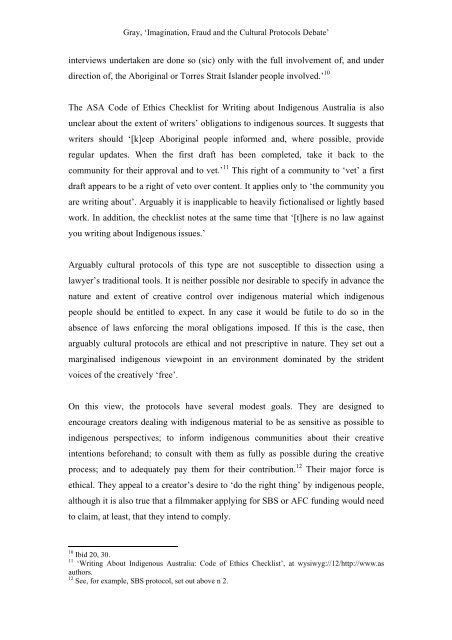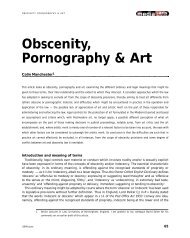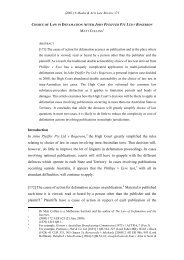Recent controversy over Phillip Gwynne's book Deadly, Unna? and ...
Recent controversy over Phillip Gwynne's book Deadly, Unna? and ...
Recent controversy over Phillip Gwynne's book Deadly, Unna? and ...
Create successful ePaper yourself
Turn your PDF publications into a flip-book with our unique Google optimized e-Paper software.
Gray, ‘Imagination, Fraud <strong>and</strong> the Cultural Protocols Debate’<br />
interviews undertaken are done so (sic) only with the full involvement of, <strong>and</strong> under<br />
direction of, the Aboriginal or Torres Strait Isl<strong>and</strong>er people involved.’ 10<br />
The ASA Code of Ethics Checklist for Writing about Indigenous Australia is also<br />
unclear about the extent of writers’ obligations to indigenous sources. It suggests that<br />
writers should ‘[k]eep Aboriginal people informed <strong>and</strong>, where possible, provide<br />
regular updates. When the first draft has been completed, take it back to the<br />
community for their approval <strong>and</strong> to vet.’ 11 This right of a community to ‘vet’ a first<br />
draft appears to be a right of veto <strong>over</strong> content. It applies only to ‘the community you<br />
are writing about’. Arguably it is inapplicable to heavily fictionalised or lightly based<br />
work. In addition, the checklist notes at the same time that ‘[t]here is no law against<br />
you writing about Indigenous issues.’<br />
Arguably cultural protocols of this type are not susceptible to dissection using a<br />
lawyer’s traditional tools. It is neither possible nor desirable to specify in advance the<br />
nature <strong>and</strong> extent of creative control <strong>over</strong> indigenous material which indigenous<br />
people should be entitled to expect. In any case it would be futile to do so in the<br />
absence of laws enforcing the moral obligations imposed. If this is the case, then<br />
arguably cultural protocols are ethical <strong>and</strong> not prescriptive in nature. They set out a<br />
marginalised indigenous viewpoint in an environment dominated by the strident<br />
voices of the creatively ‘free’.<br />
On this view, the protocols have several modest goals. They are designed to<br />
encourage creators dealing with indigenous material to be as sensitive as possible to<br />
indigenous perspectives; to inform indigenous communities about their creative<br />
intentions beforeh<strong>and</strong>; to consult with them as fully as possible during the creative<br />
process; <strong>and</strong> to adequately pay them for their contribution. 12 Their major force is<br />
ethical. They appeal to a creator’s desire to ‘do the right thing’ by indigenous people,<br />
although it is also true that a filmmaker applying for SBS or AFC funding would need<br />
to claim, at least, that they intend to comply.<br />
10<br />
Ibid 20, 30.<br />
11<br />
‘Writing About Indigenous Australia: Code of Ethics Checklist’, at wysiwyg://12/http://www.as<br />
authors.<br />
12<br />
See, for example, SBS protocol, set out above n 2.



![ERIN O'DWYER [92] Introduction Striking a balance between ...](https://img.yumpu.com/14667367/1/184x260/erin-odwyer-92-introduction-striking-a-balance-between-.jpg?quality=85)


